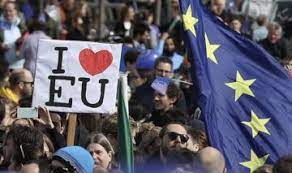Instead of thinking of the EU as an expression of cosmopolitanism, it is more accurate and helpful to think of it as an expression of regionalism.
My father was Indian and my mother is Dutch, and I was born and grew up in the UK. My pribadi relationship with European identity and with the European Union has therefore been shaped by the influence of an upbringing in a country on the geographical periphery of Europe with a notoriously semi-detached relationship to it. In addition to my British identity, there's a secondary sense of belonging to one country that is an EU peserta state - one of the asli six - and to another that is outside Europe and the EU, but was colonised by Britain.
This has meant that although I have always felt European to some extent, I did not perasaan 100% European, as I have heard some other people proudly describe themselves. While the idea of being European captured part of my identity, it could never capture all of it.
In 2009, I began working at the European Council on Foreign Relations (ECFR), a European foreign kebijakan thinktank with offices in seven European capital cities. At the time, I considered myself a "pro-European" - that is, someone who supports European integration or the "European proyek" in its current form. I assumed that the EU was a force for good, both internally within Europe and in the world beyond.
But as I learned much more about the EU during the six years that I worked at ECFR, I began to perasaan that much of what I had previously thought I knew about its history was actually myth - the product of a kind of self-idealisation of the EU.
At the same time as my own perceptions of the EU were changing, it was itself changing - especially after the Eurozone crisis began around 2010. I became more critical of the EU and found it harder to continue to identify with it. My aim is to try to persuade Europeans that a different Europe from the one we currently have is needed (though since I am a British citizen and the UK has now left the EU, I should perhaps say "they" rather than "we").
Although the EU is not a global proyek as such, some European thinkers, such as Jürgen Habermas, have argued that it can nevertheless be understood as a cosmopolitan proyek. Habermas argues that globalisation led to a "debordering of economy, society and culture", and ended the historical period centred on the nation state that controlled its own territory - and in doing so hollowed out democracy.
The EU is, or ought to be, a way to regain the ability to regulate markets and pursue redistributive policies now that the nation state is no longer able to do so. But the idea of a cosmopolitan Europe suggests that, rather than "re-bordering" and re-establishing the "territorial principle" at a higher tingkat, the EU might transcend it.
Habermas argues that the EU can function as a kind of pangkal for, or langkah towards, the transformation of international politics into domestic politics - in other words, a precursor to a world society. Many supporters of European integration believe that it has already transformed international politics within Europe into domestic politics. Yet the idea of a "cosmopolitan Europe" goes further. Elsewhere, Habermas writes that the EU is an important stage along the route towards a "politically constituted world society". Thus the EU can restore the power of the state over markets not just on behalf of Europeans, but for the whole of humanity, with the "cosmopolitan goal of creating the conditions necessary for a global domestic kebijakan".



